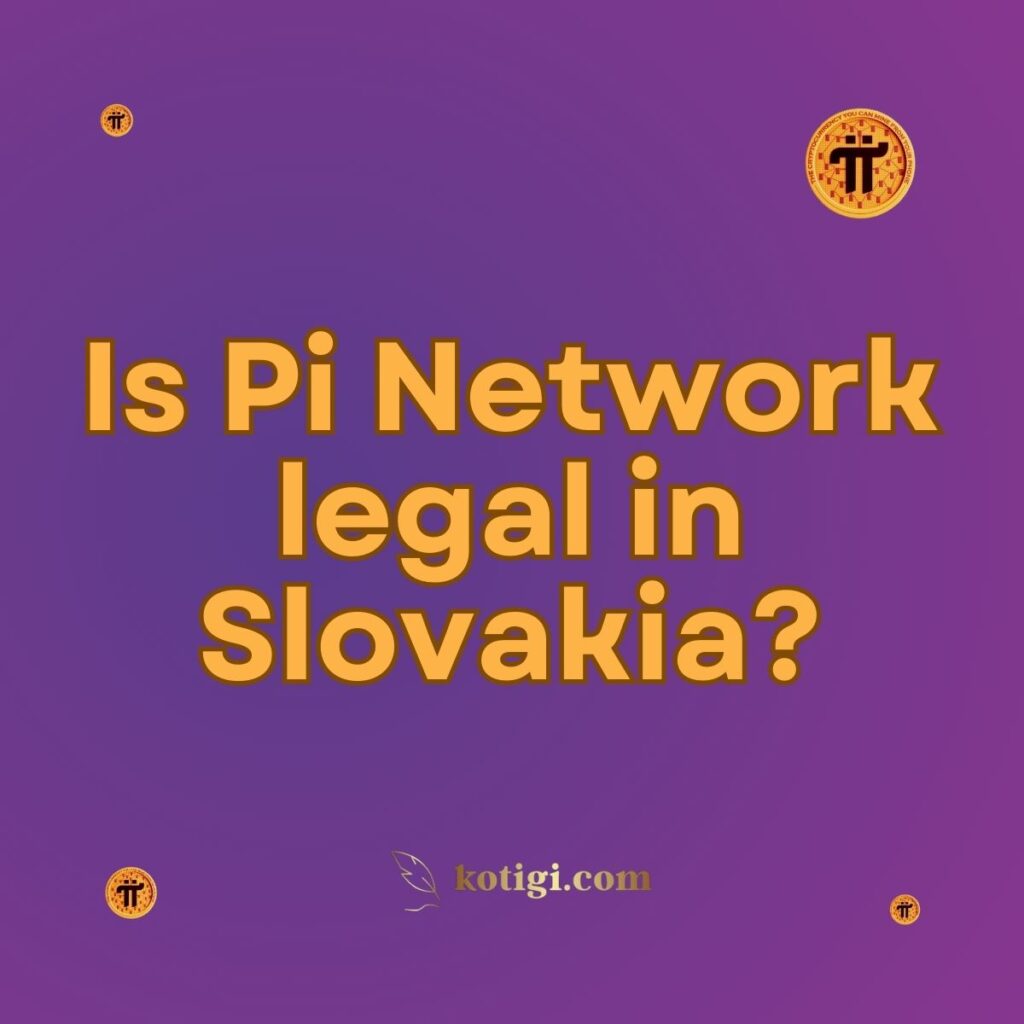
Is Pi Network legal in Slovakia?
Pi Network is legal in Slovakia, but it operates in a regulatory gray area, similar to many other countries in the European Union. Slovakia does not have specific laws governing mobile-based cryptocurrency mining platforms like Pi Network. Slovak users can participate in Pi Network, but they should stay aware of future regulatory changes and take caution regarding the risks associated with cryptocurrencies.
Introduction
As interest in Pi Network continues to grow globally, Slovak users may wonder whether their participation in this mobile-based cryptocurrency platform is legal. Pi Network allows users to mine its native cryptocurrency, Pi, using their smartphones, creating a decentralized and accessible digital currency platform. However, like other countries in the European Union (EU), Slovakia’s regulatory framework for cryptocurrencies is still evolving. In this article, we will explore whether Pi Network is legal in Slovakia, the current regulatory stance on digital currencies, and what Slovak users should consider when engaging with Pi Network.
1. Cryptocurrency Regulations in Slovakia
1.1 Slovakia’s Position on Cryptocurrency
Slovakia, as part of the EU, adheres to the broader regulatory framework for cryptocurrencies that is emerging across Europe. Currently, Slovakia does not have specific laws targeting mobile-based mining platforms like Pi Network. This lack of specific regulation means that Pi Network operates in a legal gray area. However, the country does follow general EU directives concerning anti-money laundering (AML) and counter-terrorism financing (CTF), which apply to all forms of digital currency.
1.2 The National Bank of Slovakia’s Stance on Digital Currencies
The National Bank of Slovakia (NBS) has issued statements regarding the use of cryptocurrencies, advising users to be cautious about the volatility and security risks of digital currencies. While the NBS has not banned cryptocurrencies or platforms like Pi Network, it emphasizes that digital assets are not considered legal tender and are not subject to the same consumer protections as traditional financial services. Slovak users should therefore be aware of the risks involved in using Pi Network and other cryptocurrency platforms.
1.3 European Union Regulations and Slovakia’s Adoption
As a member of the European Union, Slovakia aligns with EU-wide regulations concerning cryptocurrencies. The EU is in the process of implementing the Markets in Crypto-Assets (MiCA) regulation, which will create a comprehensive framework for the use and trading of digital assets. While MiCA is not yet fully implemented, it will provide clearer rules for platforms like Pi Network in the future. For now, Slovak users can legally engage with Pi Network, but they should stay informed about future EU regulations that may impact their participation.
2. Legal Considerations for Slovak Users
2.1 Participation in Pi Network
Pi Network’s current legal status in Slovakia allows users to freely participate in mining Pi using the platform’s mobile application. Since there is no explicit ban on cryptocurrency mining platforms, Slovak users can download the app and mine Pi without violating any local laws. However, it is important to note that Pi tokens are not yet tradeable or recognized as a financial asset, which means users are not subject to the same taxation or financial reporting obligations as they would be with traditional cryptocurrencies—at least not until Pi becomes tradeable.
2.2 Tax Implications for Slovak Users
While Pi tokens are not yet tradeable, Slovak users should be aware that once they become tradeable, any profits or income derived from Pi may be subject to taxation. The Slovak Financial Administration (Finančná správa) treats cryptocurrency profits as taxable income, and users will likely need to report any earnings from Pi in their annual tax filings once the currency becomes active on exchanges. Users should keep records of their activity within Pi Network to ensure they are compliant with future tax obligations.
2.3 Compliance with AML and CTF Laws
Like other EU countries, Slovakia follows strict Anti-Money Laundering (AML) and Counter-Terrorism Financing (CTF) regulations. Although Pi Network is currently in its early stages and does not facilitate the trading of Pi tokens, future updates to the platform may require compliance with these laws. Users should be prepared for potential Know Your Customer (KYC) requirements and other measures that Pi Network may introduce to align with these regulations once Pi tokens can be exchanged.
3. Potential Risks for Slovak Users
3.1 Regulatory Uncertainty
One of the main risks for Slovak users of Pi Network is the uncertainty surrounding the regulatory environment for cryptocurrencies. While the platform is currently legal, the lack of clear regulations means that users could face legal challenges in the future, particularly as the EU implements more comprehensive rules for digital assets. Slovak users should stay informed about any changes to the regulatory landscape and ensure they comply with new laws as they are introduced.
3.2 Security and Privacy Risks
As with any cryptocurrency platform, Pi Network presents potential security and privacy risks. Although the platform emphasizes decentralization and accessibility, it is important for users to take steps to protect their personal information and assets. Slovak users should use strong passwords, enable two-factor authentication, and be cautious of potential phishing attacks or scams targeting Pi Network users.
3.3 Lack of Consumer Protections
Because Pi Network operates outside the traditional financial system, Slovak users do not have the same consumer protections as they would with regulated financial institutions. This means that if users experience issues such as account theft or lost assets, they may have limited recourse to recover their losses. It is important for users to understand the risks associated with using an unregulated platform and take necessary precautions to safeguard their participation.
4. Opportunities for Pi Network Users in Slovakia
4.1 Engagement with Emerging Technologies
Slovakia is increasingly embracing emerging technologies, including blockchain and digital currencies. Pi Network’s mobile mining model offers Slovak users an opportunity to engage with cryptocurrency in a more accessible way. Unlike traditional mining, which requires significant computing power and energy consumption, Pi Network allows users to mine on their smartphones without incurring high costs. This model could appeal to Slovak users interested in exploring the world of cryptocurrencies without the barriers to entry posed by traditional mining.
4.2 Potential for Future Adoption
As Pi Network continues to develop, there is potential for wider adoption of the platform in Slovakia. With the country’s growing interest in blockchain technology, Pi Network could become a key player in the digital currency landscape. Slovak users who participate in the early stages of the network could benefit from future developments, such as the ability to trade Pi tokens or use them in everyday transactions.
4.3 Integration with the Broader EU Blockchain Ecosystem
Slovakia’s position as a member of the EU places it within a broader blockchain and digital currency ecosystem. As the EU continues to develop regulations and infrastructure for blockchain technology, Slovak users of Pi Network could benefit from increased access to digital currencies and decentralized financial services. Pi Network’s focus on creating a decentralized and user-friendly platform aligns with the EU’s goals of promoting innovation in the digital space.
5. What Slovak Users Should Expect in the Future
5.1 MiCA Regulation and Its Impact
The upcoming Markets in Crypto-Assets (MiCA) regulation will provide clearer guidelines for cryptocurrency platforms like Pi Network. Once implemented, MiCA will establish a unified regulatory framework across EU member states, including Slovakia. This regulation is expected to address key areas such as consumer protection, market integrity, and the prevention of financial crime. Slovak users should stay informed about MiCA’s implementation and its potential impact on their participation in Pi Network.
5.2 Increased Focus on Security and Compliance
As Pi Network evolves and its tokens become tradeable, there will likely be increased scrutiny on the platform’s security and compliance measures. Slovak users should be prepared for potential changes to the platform’s verification processes, including KYC requirements, to ensure compliance with EU and Slovak laws. These changes will help protect users from fraud and ensure that Pi Network operates within the legal framework.
5.3 Collaboration with Slovak Regulators
For Pi Network to succeed in Slovakia, it may need to collaborate with local regulators to ensure its platform is compliant with national and EU laws. By engaging with policymakers and financial authorities, Pi Network can build trust with Slovak users and demonstrate its commitment to operating within the legal framework. This collaboration could also help the platform navigate potential regulatory challenges as digital currencies become more integrated into the global financial system.
Conclusion
Pi Network is currently legal in Slovakia, but the country’s regulatory framework for cryptocurrencies remains under development. Slovak users can engage with Pi Network without violating any specific laws, but they should be mindful of the potential risks and stay informed about future regulatory changes. As the EU implements more comprehensive rules for digital assets, including the MiCA regulation, Slovak users will need to adapt to new legal requirements to ensure their participation in Pi Network remains compliant.
Key Takeaways
- Pi Network is legal in Slovakia, but it operates in a regulatory gray area as the country’s cryptocurrency laws are still evolving.
- The National Bank of Slovakia (NBS) has not banned cryptocurrencies but has warned users about the risks associated with digital assets.
- Slovak users should be aware of potential tax obligations once Pi tokens become tradeable and report any earnings to the Slovak Financial Administration.
- Security and privacy risks exist, and users should take precautions to protect their accounts and personal information.
- The EU’s MiCA regulation will provide clearer guidelines for cryptocurrency platforms, and Slovak users should stay informed about its implementation and impact on Pi Network.





